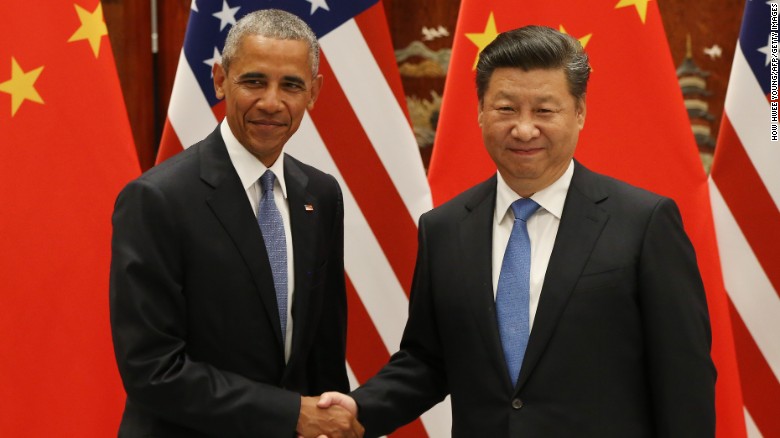Obama, China ratify climate agreements
The United States and China on Saturday each submitted their plans to reduce carbon emissions to the United Nations, officially ratifying an agreement forged last year in Paris meant to curb climate change.
President Barack Obama and Chinese President Xi Jinping submitted their nations' plans to UN Secretary General Ban Ki Moon here, the host city of this year's Group of 20 meetings.
The US and China are the world's largest carbon polluters, and officials hope their formal entry into the Paris accord will spur other nations to come aboard. The Paris agreement only goes into effect if 55 nations sign on.
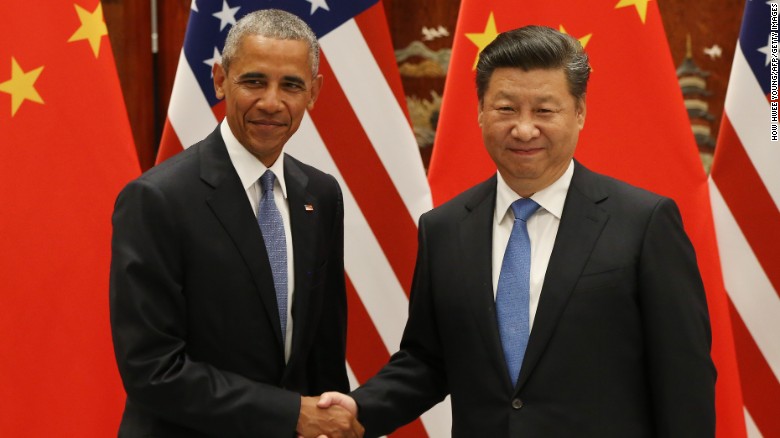
Preisdent Obama and Chinese President Xi Jinping shake hands during their meeting in Hangzhou on September 3, 2016.
Because the US plan was termed an "executive agreement," the White House says Obama did not require Senate approval for ratification.
"I believe that history will judge today's efforts as pivotal," Obama said after he and Xi formally submitted their nations' plans.
In talks with Xi after the announcement, Obama raised areas over which Washington and Beijing remain firmly at odds, including over the rising Asian power's territorial grabs in the South China Sea, its engagement in cyber warfare, a monetary policy often unwelcome in the West and longstanding concerns over human rights abuses.
"We will have candid conversations about some of those differences, issues like human rights, or cyber, or maritime," Obama said. "I am absolutely committed to ensuring not only that this is a productive meeting but that we are also setting the stage so that the next US administration comes in with a relationship that is on a strong and productive footing."
Confrontation at airport
Obama, who touched down in Hangzhou just after 2 p.m. local time (2 a.m. ET), is embarking on a final bout of delicate overseas diplomacy before his successor is elected in November. He arrived in Asia on Saturday for meetings with some of his most nettlesome counterparts.
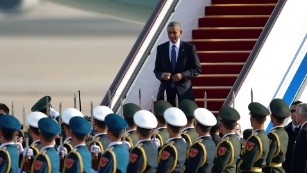
Obama's twin challenges in Asia: China and Turkey
A pomp-filled arrival ceremony on the airport's tarmac was marred, however, by scuffles between US officials and Chinese security, who attempted to keep members of the media and some senior Obama aides away from the US President.
"This is our country. This is our airport," one Chinese official insisted when US presidential aides said that American reporters were allowed to view Obama's arrival. Officials also briefly attempted to block US National Security Adviser Susan Rice from moving toward the President.
The confrontation lasted only moments before the US delegation sped away toward the city center.
It was likely just the first tense moment on a trip rife with tension for Obama, who, during his final presidential trip to Asia, is taking a final stab at face-to-face negotiations to resolve simmering disputes.
A complicated relationship
Obama's aides insist China is a success story for the administration but acknowledge the persistent differences between the countries. They said those divergences would be covered in Obama's talks with Xi, as they have been for the past several years.
"Part of what I've tried to communicate to President Xi is that the United States arrives at its power, in part, by restraining itself," Obama told CNN's Fareed Zakaria in an interview ahead of the Asia trip, previewing his message.
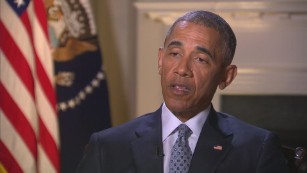
Obama on China's aggression in South China Sea
"So where we see them violating international rules and norms, as we have seen in some cases in the South China Sea or in some of their behavior when it comes to economic policy, we've been very firm," he added. "And we've indicated to them that there will be consequences."
"Our relationship with China ... defies easy and simple definitions," said Daniel Kritenbrink, Obama's senior director for Asian affairs. "We recognize and are comfortable with the fact that there exists a broad range of tensions in the US-China relationship. We don't shy away from that tension."
Tension-filled agenda
For Obama, this week's trip to China and Laos is one of his last opportunities to shape American foreign policy before other leaders adapt their approach to the US based on the next president. He hopes to make a closing argument in some of his most fraught relationships before the business of state is handed off.
Aside from Xi, Obama planned formal meetings with the leaders of Turkey and the Philippines amid new disagreements.
READ MORE: Why Obama shouldn't expect much from G20
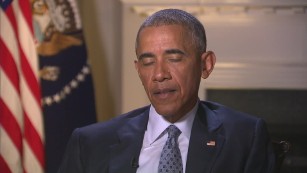
Obama: Turkey is a strong NATO ally
In talks Sunday with Turkish President Recep Tayyip Erdoğan, Obama confronts a prickly leader who remains nonetheless indispensable to the United States.
Since an attempt to overthrow him failed in July, Erdoğan has taken harsh tactics to consolidate power, worrying human rights advocates and US officials alike. The Turkish leader is expected to press Obama on anextradition request for US-based cleric Fetthulah Gulen, under suspicion in Turkey for helping plot the coup.Gulen denies involvement, and the US is demanding evidence of his involvement, but rejecting the request could worsen ties between the two countries.
For the US, alienating Erdoğan remains an unwelcome prospect given Turkey's critical role in the battle against ISIS in Iraq and Syria. Even on that front, disagreements persist. Washington has pressed Ankara to end airstrikes on Syrian Kurds, whom the US is backing in the fight against ISIS terrorists.
Deep divides over Syria have also marred Obama's relationship with Putin, adding to a litany of discord between the US and Russia that's driven relations to their lowest level since the Cold War.
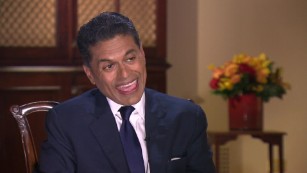
Fareed asks Obama: Is Turkey still a stable ally?
It's a final attempt to salvage what's become one of the most acrimonious relationships on the global stage. Putin's persistent support for the Syrian regime, Moscow's moves in Ukraine and the charge that Russia may be meddling in the US presidential contest have built a deeply antagonistic dynamic between the two leaders.
At his second stop, in the Southeast Asian nation of Laos, Obama is planning his first face-to-face with the controversial new leader of key US ally the Philippines.
President Rodrigo Duterte's lewd comments about women and his harsh approach to battling drug crime have earned him the label the "Donald Trump of the Philippines."
Obama has worked hard to develop the Philippines' partnership with the US and its role as a regional counterbalance to China. He's visited the country twice in his second term, and announced on a stop there in November the return of a US military presence at a critical naval base on the South China Sea.
But Duterte's derogatory comments and a spike in extrajudicial killings of suspected drug dealers put the relationship in stormier waters.
Farewell tour
Obama is expected to complete one more foreign swing as President, traveling to Peru for the Asia-Pacific Economic Cooperation summit in November and likely making additional stops in a presidential farewell tour.
But that trip is scheduled after the presidential election, meaning his stops in China and Laos this week will be his final chance to interact with world leaders before either Trump or Hillary Clinton make him a lame duck.
Amid his contentious bilateral agenda, Obama will find close allies at hand as well. His top global partner, German Chancellor Angela Merkel, is attending, as is Canadian Prime Minister Justin Trudeau, Obama's newest foreign friend.
Obama is planning to meet British Prime Minister Theresa May for the first time since she replaced his stalwart partner David Cameron. The consequences of the Brexit vote were likely to arise in the summit's various economic sessions.
Mexican President Enrique Peña Nieto, fresh from his meeting with Trump, also was scheduled to travel to Hangzhou for a slightly less scrutinized session with global leaders.
News Courtesy: www.cnn.com

